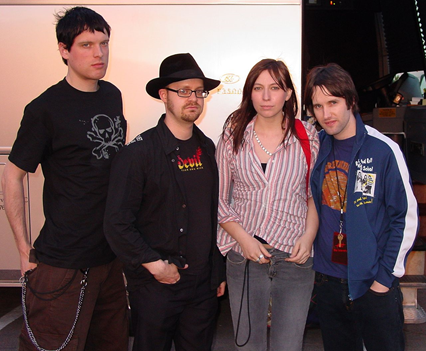Title of the work
Title of the Album(s)
Studio / Production Company
Country of the First Edition
Country/countries of popularity
Original Language
First Edition Date
First Edition Details
Ash, Nu-clear Sounds: Aphrodite. Infectious Records / Ash, Chris Kimsey, Owen Morris, 1998, 4:17 min.
Running time
Format
Official Website
ash-official.com (accessed: June 30, 2020).
Available Onllne
Spotify (accessed: June 30, 2020).
Genre
Narrative songs
Target Audience
Young adults
Cover

We are still trying to obtain permission for posting the original cover.
Author of the Entry:
Aimee Hinds, University of Roehampton, aimee.hinds89@gmail.com
Peer-reviewer of the Entry:
Susan Deacy, University of Roehampton, s.deacy@roehampton.ac.uk
Lisa Maurice, Bar-Ilan University, lisa.maurice@biu.ac.il

Ash, photographed by Nancy J Price, March 2005 (accessed: June 30, 2020). The file is licensed under the Creative Commons Attribution-Share Alike 3.0 Unported license.
Ash (Music Band)
Ash are a three-piece pop-punk band from Northern Ireland. Originally formed by core members guitarist and vocalist Tim Wheeler, bassist Mark Hamilton and drummer Rick McMurray in Downpatrick in County Down in 1992, they were joined by guitarist and vocalist Charlotte Hatherley between 1997 and 2006. They have produced seven studio albums. Wheeler and Hamilton met at school in 1989 and formed an early version of Ash as ‘Vietnam’; after disbanding, they recruited McMurray in 1992 to become Ash, named for the first short word they liked in the dictionary.
Their musical style covers indie, rock and pop-punk, and, while not suitable for younger children, often reflects their roots as a young pop-punk band (Wheeler and Hamilton formed Vietnam when they were only twelve). While many of their songs express this youthful exuberance, there are notable exceptions, including many of the tracks on the album Nu-Clear Sounds which was written and produced during a period of burnout for the band after touring their first album, 1977. Wheeler has a wide-range of inspirations for their songs, although not often delving into mythology.
Source:
Liner notes from Intergalatatic Sonic 7s
Prepared by Aimee Hinds, University of Roehampton, aimee.hinds89@gmail.com
Summary
Lyrically a very simple song, Aphrodite describes an encounter of an unidentified first-person narrator falling in love with a woman, who is referred to as the eponymous goddess. While the song is about love, the lyrics hint at a darker side to love as all consuming and weakening; the Aphrodite of the song is referred to as having a "dark power", while the narrator laments that they are "getting lost/ at such a cost/ as I fall/ I feel my heart deceiving even me" and "how can I say when it’s all so bad/ feel so weak/ feel so tired". Despite this element, the repetitive chorus is "I don’t know about much yeah, baby/ all I know about is desire, baby", intimating that the narrator is willing to accept the negative side of such a love.
Analysis
Aphrodite is summoned as a mythical goddess via references to the sea: "on these shores", which references Aphrodite’s birth from the sea foam, and through the explicit desire of the narrator: "All I know about is desire".
The song is fairly straightforward as classical reception, taking Aphrodite as the goddess of both sexual and romantic love. Although simple, the song hints at Aphrodite’s multi-layered character. There are references to Aphrodite’s "dark power" and the narrator insists "I found a darkness inside me". There are also references to deception, and there is a suggestion that "Aphrodite" has lured the narrator away from another woman: "tell me what else could I do/ instead of replacing her with you". These elements are not as commonly illustrated in pop-culture depictions of Aphrodite as her more well-known attributes as a goddess of sexual love, although they are well attested in ancient Greco-Roman mythology. Aphrodite is associated with deception through her use of manipulation to seduce throughout the Iliad (Cyrino, 2010: 35–38), and the dark side of her character is revealed in Greek lyric poetry through the potentially dangerous forces of Eros (sexual desire) and Himeros (yearning desire) (Cyrino, 2010: 45–46).
Despite the overt sexuality inherent in the mythical Aphrodite, this reception is made suitable for a younger audience through subtle allusion that on the surface focuses almost exclusively on the powerful but intangible desire (as an abstract, almost de-sexualised concept, perhaps more suited to Himeros than Aphrodite) caused by this version of Aphrodite.
Further Reading
Review: In AllMusic by Jason Ankeny (accessed: June 30, 2020);
Cyrino, Monica S., Aphrodite, London: Routledge, 2010.


